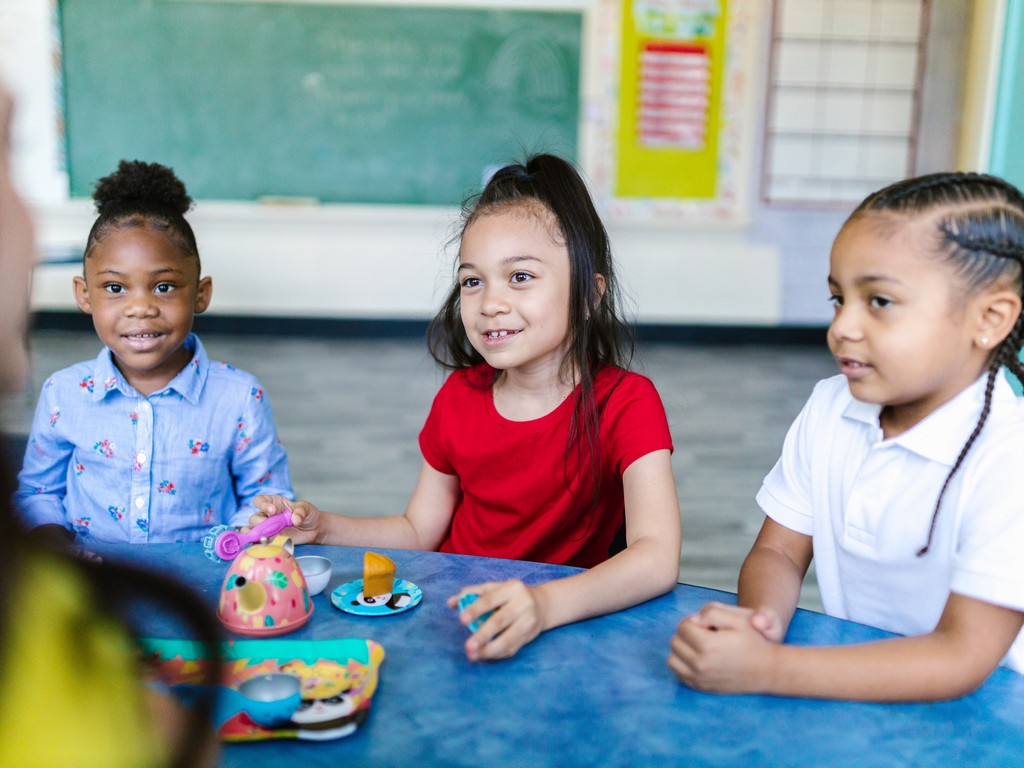Interactive learning games for kindergarten
Here are some interactive learning games specifically designed for kindergarten students:
1. ABCya: This website has a variety of educational games for kindergarten students, including letter and number recognition, basic math skills, and more.
2. PBS Kids: PBS Kids has a range of educational games and activities for kindergarten students, covering subjects such as science, math, reading, and social studies.
3. Starfall: This website has a variety of games and activities focused on teaching reading and phonics skills to kindergarten students.
4. Seussville: Based on the works of Dr. Seuss, this website has educational games and activities that teach basic reading and math skills.
5. Funbrain Jr.: This website has a range of educational games for kindergarten students covering subjects such as math, reading, and problem-solving skills.
6. Turtle Diary: Turtle Diary offers a variety of educational games and activities for kindergarten students, including math, reading, and science lessons.
Fun and Engaging Interactive Learning Games for Kindergarten Math Skills
Here are some fun and engaging interactive learning games for kindergarten math skills:
1. Math Playground: This website has a variety of math games for kindergarten students, covering topics such as counting, addition, and subtraction.
2. Cool Math 4 Kids: This website has a range of interactive games and activities designed to teach kindergarten students basic math skills.
3. SplashLearn: SplashLearn offers a range of math games and activities for kindergarten students, covering topics such as counting, addition, and subtraction.
4. ABCya Math: ABCya offers a range of math games for kindergarten students, covering topics such as number recognition, counting, and basic addition and subtraction.
5. Funbrain Jr. Math: Funbrain Jr. has a variety of math games and activities designed for kindergarten students, covering topics such as counting, addition, and subtraction.
6. Math Game Time: Math Game Time offers a range of math games and activities for kindergarten students, covering topics such as counting, addition, and subtraction.
The Top 10 Types of Interactive Learning Games for Kindergarten
Here are the top 10 types of interactive learning games for kindergarten students:
1. Number and Counting games: These games help students learn to recognize numbers and count objects.
2. Letter and Word Recognition games: These games help students learn to recognize letters and basic sight words.
3. Phonics and Reading games: These games help students learn to read and recognize sounds and words.
4. Math and Problem-Solving games: These games help students learn basic math concepts and develop problem-solving skills.
5. Science and Nature games: These games help students learn about the world around them, including animals, plants, and the environment.
6. Geography and Social Studies games: These games help students learn about different countries and cultures, as well as basic geography concepts.
7. Fine Motor Skills games: These games help students develop fine motor skills, such as hand-eye coordination and dexterity.
8. Creative and Artistic games: These games help students express themselves creatively and develop their artistic skills.
9. Music and Sound games: These games help students learn about music and sound.
10. Critical Thinking and Logic games: These games help students develop critical thinking and logical reasoning skills, such as problem-solving, decision-making, and strategy development.
The Ultimate Guide to Interactive Learning Games for Kindergarten Writing Skills
Interactive learning games are an effective way to help kindergarten students develop their writing skills. Here is the ultimate guide to interactive learning games for kindergarten writing skills.
1. Alphabet Tracing: This game helps students learn how to write each letter of the alphabet by tracing the letters. It also helps them understand the shape and form of each letter.
2. Letter Formation: This game helps students learn how to form letters by following the steps to write each letter. It also helps them understand the sequence of strokes required to form each letter.
3. Sight Word Writing: This game helps students learn how to write sight words by tracing and writing the words. It also helps them recognize and learn commonly used sight words.
4. Story Creation: This game helps students create their own stories by choosing characters, settings, and events to include in their stories. It also helps them develop their storytelling skills and creative writing abilities.
5. Sentence Building: This game helps students learn how to build sentences by selecting words and placing them in the correct order. It also helps them understand basic sentence structure.
Boost Your Child’s Language Development with Interactive Learning Games for Kindergarten
As a parent, you can boost your child’s language development by incorporating interactive learning games into their routine. Here are some interactive learning games for kindergarten that can help your child’s language development:
1. Picture Match: This game helps your child develop their vocabulary by matching pictures to words.
2. Rhyming Words: This game helps your child develop their phonemic awareness by identifying words that rhyme.
3. Word Bingo: This game helps your child learn new words and improve their listening skills.
4. Storytelling: This game encourages your child to use their imagination and develop their storytelling skills.
5. Word Building: This game helps your child learn how to spell and read new words by building them from individual letter tiles.
6. Letter Sounds: This game helps your child learn the sounds of each letter in the alphabet.
7. Vocabulary Builder: This game helps your child learn new words and improve their comprehension skills by matching words to their definitions.
8. Sentence Construction: This game helps your child learn how to construct sentences by arranging words in the correct order.
The Best Interactive Learning Games for Kindergarten Social Skills
Interactive learning games are a fun and effective way to help kindergarten students develop their social skills. Here are some of the best interactive learning games for kindergarten social skills:
1. Feelings Charades: This game helps students recognize and express different emotions by acting them out.
2. Sharing and Taking Turns: This game helps students learn how to share and take turns by playing games that require cooperation and collaboration.
3. Empathy Building: This game helps students develop empathy by asking them to imagine how someone else might feel in a given situation.
4. Good Manners: This game teaches students proper etiquette and manners by role-playing different scenarios.
5. Building Friendships: This game helps students learn how to make friends by encouraging them to find common interests and engage in social activities.
6. Problem Solving: This game helps students learn how to solve problems by working together to find solutions to different challenges.
7. Respect and Kindness: This game teaches students the importance of respect and kindness by encouraging them to show empathy and kindness towards others.
The Best Interactive Learning Games for Kindergarten Science Skills
Kindergarten is an exciting time for young learners to explore the world around them. Interactive learning games can help them develop their scientific skills and foster a love of learning. Here are some of the best interactive learning games for kindergarten science skills:
1. Sink or Float: This game teaches children about buoyancy and density by having them guess whether objects will sink or float in water.
2. Nature Scavenger Hunt: This game encourages children to explore the outdoors and learn about different plants, animals, and natural objects.
3. Weather Watch: This game teaches children about different types of weather by having them observe and record weather patterns.
4. Build a Bug: This game helps children learn about the anatomy of insects by allowing them to construct and customize their own bug.
5. Plant Life Cycle: This game teaches children about the life cycle of plants by having them plant and care for seeds, and observe the growth process.
6. Animal Habitats: This game teaches children about different animal habitats and the types of animals that live in them.
The Ultimate Guide to Interactive Learning Games for Kindergarten
Interactive learning games can be a fun and effective way to help kindergarten students develop their cognitive, social, and emotional skills. Here is the ultimate guide to interactive learning games for kindergarten:
1. Alphabet Games: These games help students learn the letters of the alphabet and their sounds through activities such as letter matching, letter tracing, and phonics games.
2. Number Games: These games help students learn basic math concepts such as counting, addition, and subtraction through activities such as number recognition, number sequencing, and math puzzles.
3. Social Skills Games: These games help students develop social skills such as empathy, cooperation, and communication through activities such as role-playing, problem-solving, and team-building games.
4. Science Games: These games help students learn about the natural world and scientific concepts such as the life cycle, weather, and the human body through activities such as nature scavenger hunts, experiments, and observation games.
5. Creative Games: These games help students develop their creativity and imagination through activities such as art projects, storytelling games, and music games.

Meet Helen, a passionate educator and Montessori expert with over 15 years of experience in the field. She holds a Bachelor’s degree in Education and a Master’s degree in Montessori Education. Helen’s love for the Montessori method began when she was introduced to it during her own childhood education. Since then, she has dedicated her career to promoting the Montessori approach as a way to help children develop their full potential. Through her work as a teacher, consultant, and writer, Helen has helped countless parents and educators understand and implement the Montessori philosophy in their own lives. Her articles and books have been published in various education journals and she has been invited to speak at conferences around the world. Helen believes that every child has the potential to thrive and that Montessori education provides the tools to make that happen.
